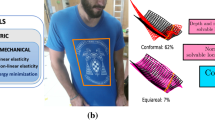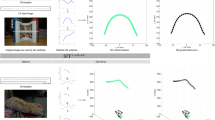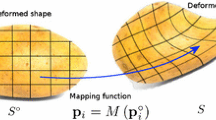Abstract
We present a surface deformation framework for the problem of 3D shape recovery. A spatially smooth and topologically plausible surface mesh representation is constructed via a surface evolution based technique, starting from an initial model. The initial mesh, representing the bounding surface, is refined or simplified where necessary during surface evolution using a set of local mesh transform operations so as to adapt local properties of the object surface. The final mesh obtained at convergence can adequately represent the complex surface details such as bifurcations, protrusions and large visible concavities. The performance of the proposed framework which is in fact very general and applicable to any kind of raw surface data, is demonstrated on the problem of shape reconstruction from silhouettes. Moreover, since the approach we take for surface deformation is Lagrangian, that can track changes in connectivity and geometry of the deformable mesh during surface evolution, the proposed framework can be used to build efficient time-varying representations of dynamic scenes.
This work has been supported by the European FP6 Network of Excellence 3DTV (www.3dtv-research.org).
Preview
Unable to display preview. Download preview PDF.
Similar content being viewed by others
References
Montagnat, J., Delingette, H., Ayache, N.: A review of deformable surfaces: topology, geometry and deformation. Image Vision and Computing 19, 1023–1040 (2001)
Kass, M., Witkin, A., Terzopoulos, D.: Snakes: Active contour models. Int. J. Computer Vision 1, 321–331 (1988)
Terzopoulos, D., Witkin, A., Kass, M.: Constraints on deformable models: Recovering 3D shape and nonrigid motions. Artificial Intelligence 36, 91–123 (1988)
Cohen, L.D.: On active contour models and balloons. CVGIP: Image Understanding 53, 211–218 (1991)
Malladi, R., Sethian, J.A., Vemuri, B.C.: Shape modeling with front propagation: A level set approach. IEEE Trans. Pattern Analysis and Mach. Intelligence 17, 158–175 (1995)
Magnor, M.A., Goldlücke, B.: Spacetime-coherent geometry reconstruction from multiple video streams. In: Int. Symp. 3DPVT, pp. 365–372 (2004)
Curless, B., Levoy, M.: A volumetric method for building complex models from range images. In: ACM SIGGRAPH, pp. 303–312 (1996)
Rocchini, C., Cignoni, P., Montani, C., Pingi, P., Scopigno, R.: A low cost 3D scanner based on structured light. In: Proc. EUROGRAPHICS, vol. 20, pp. 299–308 (2001)
Mueller, K., Smolic, A., Merkle, P., Kautzner, M., Wiegand, T.: Coding of 3D meshes and video textures for 3D video objects. In: Proc. Picture Coding Symp. (2004)
Duan, Y., Yang, L., Qin, H., Samaras, D.: Shape reconstruction from 3D and 2D data using PDE-based deformable surfaces. In: Pajdla, T., Matas, J(G.) (eds.) ECCV 2004. LNCS, vol. 3023, pp. 238–251. Springer, Heidelberg (2004)
Esteban, C.H., Schmitt, F.: Silhouette and stereo fusion for 3D object modeling. Computer Vision and Image Understanding 96, 367–392 (2004)
Kobbelt, L.P., Bareuther, T., Seidel, H.: Multiresolution shape deformations for meshes with dynamic vertex connectivity. In: Proc. EUROGRAPHICS, vol. 19 (2000)
Hoppe, H., DeRose, T., Duchamp, T., McDonald, J., Stuetzle, W.: Mesh optimization. In: ACM SIGGRAPH, pp. 19–26 (1993)
Anuar, N., Guskov, I.: Extracting animated meshes with adaptive motion estimation. In: Proc. of the 9th Int. Fall Workshop on Vision, Modeling, and Visualization (2004)
Author information
Authors and Affiliations
Editor information
Editors and Affiliations
Rights and permissions
Copyright information
© 2006 Springer-Verlag Berlin Heidelberg
About this paper
Cite this paper
Sahillioğlu, Y., Yemez, Y. (2006). A Surface Deformation Framework for 3D Shape Recovery. In: Gunsel, B., Jain, A.K., Tekalp, A.M., Sankur, B. (eds) Multimedia Content Representation, Classification and Security. MRCS 2006. Lecture Notes in Computer Science, vol 4105. Springer, Berlin, Heidelberg. https://doi.org/10.1007/11848035_75
Download citation
DOI: https://doi.org/10.1007/11848035_75
Publisher Name: Springer, Berlin, Heidelberg
Print ISBN: 978-3-540-39392-4
Online ISBN: 978-3-540-39393-1
eBook Packages: Computer ScienceComputer Science (R0)




